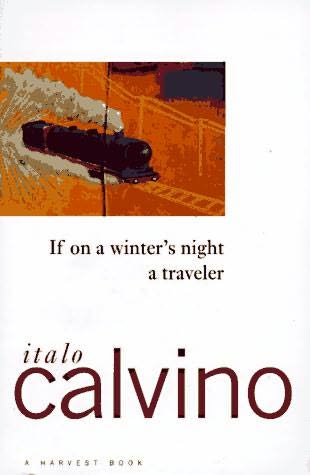From my last post, I am still not really getting a strong hold on the book yet. In thinking closely about Calvino's writing, I decided that sentence, by sentence, I think he is a wonderful writer. His combination of words make beautiful language and some of his observations are extremely astute. The problem I am continuing to have is that I cannot make sense of it all. By this point, I am expecting very little from the "meaty" plot sections of the book. Instead, I am trying to really appreciate what Calvino has to say about writing or reading itself. What better way to get into the author's mind and see the underlying construction of a story than to have a template of a story,serving as example, next to it. I thought it was funny when Ludmilla tells what type of novel she wants to read --"should have as its driving force only the desire to narrate, to pile stories upon stories, without trying to impose a philosophy on you, simply allowing you to observe its own growth, like a tree, an entangling, as if of branches and leaves" (92). Here, Calvino seems to poke fun at himself. He does not simply narrate or allow a natural growth -- he is an incessant presence as a creative shaper. I have been frustrated all along with Calvino's careful control on my reading experience; telling me how I would react, giving out sparce information, etc. I like how Calvino acknowleges frustrations the reader might have, such as with the existence of multiple, unsatisfied stories. Regarding these, Calvino says, "...so it is not impossible that the person who follows the story may feel himself a bit cheated...but it is not impossible that this is the very effect I aimed at when I started narrating, or let's say it's a trick of the narrative...a rule of discretion that consists in maintaining my position slightly below the narrative possibilities at my disposal" (109). In this passage, Calvino seems almost arrogant, saying that we should trust him because of his masterful ability to weave together a true, new reading experience. If he is right, then this is going to be remembered as one of the most unique books I have read. If he is wrong, then Calvino was arrogant and too self-reflexive. Although I am having trouble with the book, I am leaning towards Calvino being right about his intentions being brilliant for the work. This is because, as I mentioned before, sentence by sentence, his writing is beautiful.
DISCUSSION QUESTIONS
1) Does Calvino think too highly of himself and his ability to redefine how stories are told? Or is he a master whose working between the lines to offer a brand new experience for the reader?
2)What kind of reader would Ludmilla be in the "reader-response" theory?
3) "Let us see, Other Reader, if the book can succeed in drawing a true portrait of you, beginning with the frame and enclosing you from every side, establishing the outlines of your form" (142)...
Do you think that the book succeeds in this?
The blog for SUNY Binghamton's Spring'09 COLI 214B 02 Literature and Society Class. Chapter summaries, analyses and discussion of prescribed texts written by students.
Thursday, March 5, 2009
Subscribe to:
Post Comments (Atom)






No comments:
Post a Comment